Hello! My name is Katarina Krumplevska and I have just finished my Undergraduate Research Assistantship position within the Faculty of Health and Social Sciences. The project I worked on was to validate a questionnaire which explored attitudes and beliefs of pain. This involved data collection, data analyses and starting to write up the results in a paper. As a graduate in psychology I had the experience of being a research assistant last year within the Psychology Department where I was involved in a health psychology project. I really appreciated the challenge of learning about pain and completing statistical analyses which were new. I think this project provided a great opportunity to realize that I can rise to the challenge of a project and work with people I have not worked with before. This has given me confidence which I believe will contribute to my next venture to do the MSc of Clinical and Developmental Neuropsychology at Bournemouth University in September.
/ Full archive
Lunchtime Seminar on Measuring and Monitoring Research Impact 1-1.50pm, Wednesday 19th August in R301!
For those who will be around, please come along to support Jo George’s lunchtime seminar to hear her ‘Reflections on Measuring and Monitoring Research Impact from my Undergraduate Research Assistantship’. She will present her findings around what makes a good impact case study, the case studies she has been working on, as well as her personal learnings. Hope you can make it!
EC Info Day – EU Brokerage Event on Key Enabling Strategies taking place on the 1st of Oct 2015
EC Info days: relating to EU Brokerage Event on Key Enabling Strategies is being held on the:
1st of October 2015 in Strasbourg, France 
Info days and brokerage events run by the EC are an opportunity to get an overview of work programmes covering the 2016 and 2017 calendar years, meet up and hear from others who are interested in the same programme and potentially form links and build consortia for future applications.
Please click on the link below to book or register your interest:
http://ec.europa.eu/research/index.cfm?pg=events&eventcode=2DE41882-FADE-977A-8FDF508D5871C5AA
Please let Emily or myself know if you intend to go so we can co-ordinate if others also wish to attend.
RCUK Telling Tales of Engagement Competition 2015
 The RCUK Digital Economy Theme (DET) is running a competition designed to help capture and promote the impact that your digital economy research is having. Three prizes of £10,000 are available to support researchers to further tell the story of research impact in an interesting and engaging way to a wider audience.
The RCUK Digital Economy Theme (DET) is running a competition designed to help capture and promote the impact that your digital economy research is having. Three prizes of £10,000 are available to support researchers to further tell the story of research impact in an interesting and engaging way to a wider audience.
The competition, which has been co-developed with the National Centre for Universities and Business (NCUB), is designed to produce very informative case study exemplars which can be used to help the wider research community develop understanding of the nature of a pathway to impact. It aims to encourage applicants to tell a story to describe the pathway to impact which actually occurred. This should be even more informative because understanding how impact arises is key to planning for future impact pathways.
They want the stories to portray impact as including what capability has changed outside the institutions, and what benefits that exercising this capability change has then delivered. Each ‘Tale of Engagement’ in showing how the actual impact arises and the evidence of the impact itself will thereby show clearly the link between the impact and the research. Choosing how to tell the story should reflect the nature of the story itself. They hope that giving the timeline of the whole story should stimulate thinking on more imaginative and illustrative ways to tell the tale of engagement and the resulting impact.
You will need to complete the form on this page, addressing the questions raised in the ‘Scope of Competition’ section of the full call document, and taking into account the “Guidance on completing proforma” notes. You will need to attach to the form, a single PowerPoint slide which summarises your entry in an interesting and engaging way.
Resources
- Telling Tales of Engagement Competition 2015 (PDF 118KB)Full call document
| Closing date: | 01 December 2015 at 12:00 |
|---|
Please contact your RKEO Funding Development Officer in the first instance if you are interested in applying to this call.
New publication by BU PhD student Jib Acharya
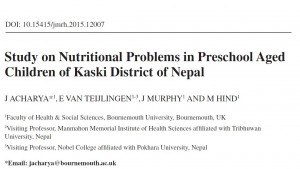
Congratulations to FHSS Ph.D. student Mr. Jib Acharya, whose paper ‘Study of nutritional problems in preschool aged children in Kaski District in Nepal’ has just been published in the Journal of Multidisciplinary Research in Healthcare [1]. The academic paper, based on his Ph.D. thesis, reports on his mixed-methods Public Health study addressing attitudes and knowledge of mothers of young children (pre-school aged) in one particular district in Nepal. The research comprises a quantitative survey and qualitative focus groups. Jib Acharya, who is originally from Nepal, compares and contrasts the attitudes, knowledge and behaviour of poor rural and poor urban women (=mothers) in that district. The research is supervised by Dr. Jane Murphy, Dr. Martin Hind and Prof. Edwin van Teijlingen.
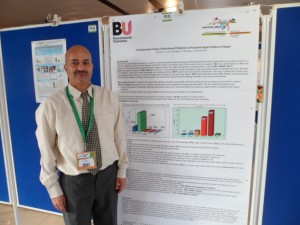
Prof. Edwin van Teijlingen
CMMPH
Reference:
- Acharya, J., van Teijlingen, E., Murphy, J., Hind, M. (2015) Study of nutritional problems in preschool aged children in Kaski District in Nepal, Journal of Multidisciplinary Research in Healthcare 1(2): 97-118.
Fusion Investment Fund 2014/15: Upskilling the Engineering Workforce – an update
In December 2014 we received funding from the Fusion Investment Fund for a project which we hoped would allow us to strengthen strategic partnerships with local/national engineering companies (see previous posting). We are happy to report that the project has been a success.
Over the past few months we have been working with the Missions Systems division of Cobham PLC, based in Wimborne, and four of their employees, who are also students on our innovative Flexible Learning MEng (Hons) Engineering degree, to develop a Professional Registration Mentoring Scheme. Cobham was an ideal company to work with as it is the third largest aerospace and defence employer in the UK with over 12000 employees globally and 500 employees at the Wimborne site alone.
The main outcome of the project has been the development of the structure of the scheme, scheme material and promotional material.

In addition, a Festival of Learning lecture was developed entitled: ‘what professional engineers do and how to become one’. The lecture was attended by a mix of children and their parents who wished to find out more about embarking on engineering as a career and engineering employees from a range of industries who wished to find out more about how to develop themselves professionally. Promotional flyers for the professional registration mentoring scheme were provided to the engineering employees to take back to their companies. It is hoped interest from employers in the scheme will be generated from the event.
The scheme has also been integrated into the flexible learning engineering degree curriculum through the Level 6 unit Advanced Engineering and Level 7 unit MEng Project. Students studying on the degree will be mentored for up to a year after graduation to provide professional development opportunities by achieving professional registration. Thus, preparing the individual with key skills for the workplace and creating sought after individuals who will be recognised as the future leaders in their field.
Finally, a strong link has been developed with Cobham which is expected to carry on after this project. The links and reputation of BU developed through this project will be used to build the relationship with Cobham to ensure the apprentices progress to BU to complete their academic studies on the FdEng Engineering and MEng Engineering degrees.
A future goal, once established regionally, is to secure recognition for the scheme from an appropriate professional body. This will then provide the credibility to expand the scheme nationally
Please do feel free to get in touch with us if you would like further information.
Dr Phil Sewell – (Principal Investigator) – Acting Head of Design and Engineering Department/Associate Professor – psewell@bournemouth.ac.uk
Dr Tania Humphries-Smith – Associate Professor – thumphri@bournemouth.ac.uk
Consider the editor!

The most recent edition of the international journal Women & Birth includes a discussion paper highlighting the role of the academic journal editor, an often misunderstood ‘job’ in academic scholarship [1]. The Bournemouth University authors of this paper are all three active as journal editors and sit on several editorial boards of scientific journals. The role of the journal editor may not be well known by budding authors. The purpose of this article is to explain the editor’s role in order to encourage future participation in reviewing and publication.
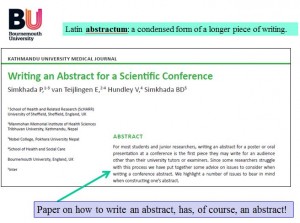
This latest paper is part of a series of articles written by staff in the Centre for Midwifery, Maternal & Perinatal Health (CMMPH) on academic writing [2-4]. These ‘how-to-do’ papers offer advice to junior researchers and postgraduate students. Several of the papers in this series are co-authored with Bournemouth University’s Visiting Faculty, including Dr. Brijesh Sathian (based in Nepal), Prof. Padam Simkhada (Liverpool John Moores University), Ms. Jillian Ireland (Poole Hospital NHS Foundation Trust), Prof. Debra Bick ( King’s College, London), Dr. Bibha Simkhada (Inter, Nepal) and Dr. Emma Pitchforth (RAND Europe, Cambridge). The range of publications includes papers on advice for article titles [5], tricky issues such as authorship and author order [6-7], selecting the most appropriate journal for your paper [8] and writing up qualitative research [9]. Whilst a further paper offers advice on writing an abstract for a scientific conference [10].
Edwin van Teijlingen, Vanora Hundley & Jenny Hall
CMMPH
Twitter: @EvTeijlingen @VanoraHundley @hallmum5
References:
- Hall, J., Hundley, V., van Teijlingen, E. (2015) The journal editor: friend or foe? Women & Birth 28(2): e26-e29.
- Simkhada, P., van Teijlingen, E., Hundley, V. (2013) Writing an academic paper for publication, Health Renaissance 11(1): 1-5.
- van Teijlingen, E., P.P., Simkhada, B., Ireland, J. (2012) The long & winding road to publication, Nepal Journal Epidemiology 2(4): 213-215.
- van Teijlingen, E., P.P., Rizyal, A. (2012) Submitting a paper to an academic peer-reviewed journal, where to start? Health Renaissance 10 (1): 1-4.
- van Teijlingen, E., Ireland, J., Hundley, V., Simkhada, P., Sathian, B. (2014) Finding the right title for your article: Advice for academic authors, Nepal Journal of Epidemiology 4(1): 344-347.
- van Teijlingen, E., Hundley, V., Bick, D. (2014) Who should be an author on your academic paper? Midwifery 30: 385-386.
- Hundley, V., van Teijlingen, E., Simkhada, P. (2013) Academic authorship: who, why and in what order? Health Renaissance 11(2): 98-101.
- van Teijlingen, E., Hundley, V. (2002) Getting your paper to the right journal: a case study of an academic paper, Journal of Advanced Nursing 37(6): 506-511.
- Pitchforth, E., Porter, M., van Teijlingen, E.R., Forrest Keenan, K. (2005) Writing up and presenting qualitative research in family planning and reproductive health care, Journal of Family Planning & Reproductive Health Care 31 (2): 132-135.
- Simkhada, P., van Teijlingen E., Hundley, V., Simkhada, B.D. (2013) Writing an Abstract for a Scientific Conference, Kathmandu University Medical Journal 11(3): 262-265.
Progress on public engagement: Institutional survey – your support is required!
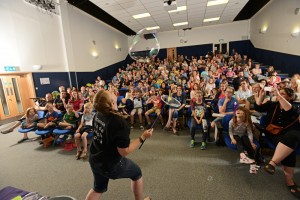
In 2012, Bournemouth University signed up to the National Co-ordinating Centre for Public Engagement (NCCPE) Manifesto for public engagement. Further details can be found here: http://bit.ly/1LNCZZv.
In order to understand the extent to which as BU is embedding public engagement, staff and students are being asked to complete this survey on annual basis. This will be used to assess progress and inform future plans.
The survey can be found here: http://bit.ly/1L1Rryf and I would be most grateful if you could promote participation in the survey to any staff and students that you work with.
Three £20 Amazon vouchers will be given to participants entering the prize draw. It is anticipated that this survey will take 10 minutes to complete. Responses must be received by 4th September.
Any queries about this survey should be sent to Rebecca Edwards (redwards@bournemouth.ac.uk). All responses will remain confidential.
Reminder that EoI are required for NERC standard grants round January 2016
 Following on from my previous blog post informing you of NERC’s demand management measures, this is a reminder that only one application can be submitted to the January 2016 standard grant round. Therefore, expressions of interest are required by 21st August. All details of the competition process and the form can be found here.
Following on from my previous blog post informing you of NERC’s demand management measures, this is a reminder that only one application can be submitted to the January 2016 standard grant round. Therefore, expressions of interest are required by 21st August. All details of the competition process and the form can be found here.
Media training for ESRC-funded researchers
Media training is changing at the ESRC.
Having taken on board extensive feedback from their delegates they are moving their media training forward to focus on the practical elements of working with the media.
They now offer a one day-long media training session that provides the opportunity to develop practical media skills in a safe environment.
They believe by concentrating their resources this way they will be able to give maximum opportunity for researchers, no matter what stage of their career, to develop their skills and feel comfortable handling media interviews. Whether a PhD student, postdoctoral researcher or senior fellow, the new practical media training session provides the guidance needed to engage the media with confidence – and plenty of opportunity to practice.
For more information, please see the article here.
The course will be taking place in different locations throughout the year. The forthcoming course dates are:
- 17 September 2015 – London
- 15 October 2015 – Cambridge
- 30 October 2015 – London
- 12 November 2015 – London
Book a place on a media training course.
For further information on any aspect of ESRC media training days please contact esrcmediatraining@esrc.ac.uk
GeoNet cultural heritage landscapes and deathscapes
In our last GeoNet seminar Craig Young and Tim Darville discussed cultural heritage landscapes and deathscapes, followed by Anne Luce who examined the presentation of suicide in the media.
Craig Young introduced the seminar discussing the evolving patterns of death and the changing social attitudes towards death. The physical absence of the dead body is becoming significantly apparent when illustrating the changes in the memorialisation of the dead. For example, new ways of scattering ashes such as sending in to space, converting it in to diamonds as a permanent keepsake and using social media to contact others to help spread ashes to different continents. An increase in the memorialisation at the site of death in the form of roadside shrines indicates a shift away from official ceremonies to more informal and open displays of grief.
Tim Darville, who has recently published on life, death, ritual and regional identity in Britain c. 1600 BC, discussed the relationship and practices between the living and dead. He used Stonehenge as an example. I found it interesting to discover that Stonehenge originated as a burial ground, and as a monument to the dead. Darville went on to explain links between the spatial orientations of the stone structures with the celestial calendar. The landscape changes from contained to dispersed, each holding its own celestial meaning as a burial site.
Anne Luce carried on the discussion talking about suicide in the media. Changes in attitude towards suicides have resulted in more high profile suicides reported in the media. For example, the Bridgend suicides in Wales 2008 were presented by the media as a suicide cult, therefore being picked up by the international press. The growth in social media sites, such as Facebook, has led to personal and public displays of remembrance in the form of memorial pages, which in some instances has led to an increased awareness of online bullying as a main cause of suicide.
Charlotte Unwin, GeoNet Intern
EC Info Day – Health, Demographic Change and Well-being taking place on the 18th Sept 2015
EC Info days: relating to Health, Demographic Change and Well-being are being held on the:
18th September 2015, Brussels, Belgium 
Info days and brokerage events run by the EC are an opportunity to get an overview of work programmes covering the 2016 and 2017 calendar years, meet up and hear from others who are interested in the same programme and potentially form links and build consortia for future applications.
Please click on the link below now to book or register you interest – this will definitely be a popular event!
http://ec.europa.eu/research/index.cfm?pg=events&eventcode=7829B368-BCD2-7BA8-039C396F0C62FA5D
Please let Emily or myself know if you intend to go so we can co-ordinate if others also wish to attend.
Launch of BU’s new Bridging Fund Scheme for research staff
 This month sees the launch of the new BU Bridging Fund Scheme which aims to provide additional stability to fixed-term researchers who continue to rely heavily on short-term contracts usually linked to external funding. This situation sometimes impacts negatively on continuity of employment and job security and can result in a costly loss of researcher talent for the institution.
This month sees the launch of the new BU Bridging Fund Scheme which aims to provide additional stability to fixed-term researchers who continue to rely heavily on short-term contracts usually linked to external funding. This situation sometimes impacts negatively on continuity of employment and job security and can result in a costly loss of researcher talent for the institution.
The new Bridging Fund Scheme aims to mitigate these circumstances by redeploying the researcher where possible, or where feasible, by providing ‘bridging funding’ for the continuation of employment for a short-term (maximum three months) between research grants. It is intended to permit the temporary employment, in certain circumstances, of researchers between fixed-term contracts at BU, for whom no other source of funding is available, in order to:
(a) encourage the retention of experienced and skilled staff, and sustain research teams and expertise;
(b) a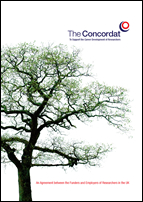 void the break in employment and career which might otherwise be faced by such staff;
void the break in employment and career which might otherwise be faced by such staff;
(c) maximise the opportunity for such staff to produce high-quality outputs and/or research impact at the end of funded contracts/grants.
This is a great step forward for BU and for BU’s researchers and is an action from our EC HR Excellence in Research Award which aims to increase BU’s alignment with the national Concordat to Support the Career Development of Researchers (further information is available here: https://research.bournemouth.ac.uk/research-environment/research-concordat/).
You can read the full guidelines here: BU bridging fund scheme guidelines v1 070815
HE Policy Update
Monday
Ernst and Young
Ernst and Young, one of the UK’s biggest graduate recruiters is to remove degree classification from the entry criteria for its hiring programmes. The company claims they have found “no evidence” that success at university was correlated with achievement in professional qualifications. Ernst and Young drops degree classification threshold for graduate recruitment (THE).
Tuesday
UCAS
UCAS has been accused of blocking efforts to improve social mobility by refusing to release important data it holds on students from poor backgrounds. The Chair of the Social Mobility and Child Poverty Commission, has called on UCAS to open up its gold mine of information to help end the “national scandal” of disadvantaged children missing out on places at top universities. Ucas refusing to release data it holds on students from poor backgrounds – while making £12m a year selling applicants’ details (The Independent).
Wednesday
A Level Results
A shift towards teenagers taking the more traditional academic subjects will be revealed when A-level results are published next week. More students are now opting to take English and Maths at A-Level. A-level results will reveal shift in focus towards more traditional academic subjects (The Independent).
Thursday
Graduate Wages
According to a study by the Sutton Trust and upReach, Graduates’ wages increase more quickly if they went to a private school, compounding the fact that privileged university leavers attract higher starting salaries too. Graduates who went to private school ‘get bigger pay rises’ (THE).
Friday
Graduate Tax
When speaking on BBC Radio 4’s Today programme, Andy Burnham, a Labour leadership contender, promised to replace tuition fees with a graduate tax if he leads the party into government. This policy would be a shift from Labour’s current policy of lowering tuition fees in England to £6,000 a year by reducing tax relief enjoyed by those earning above £150,000. Andy Burnham pledges to replace tuition fees with graduate tax (THE).
Introducing Oliver Cooke: Student Engagement Coordinator in the Knowledge Exchange and Impact Team
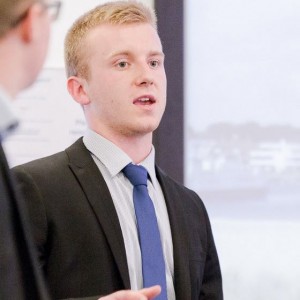
Hello my name is Oliver Cooke and I have recently started on my work placement working as the new Student Engagement Coordinator within the Research and Knowledge Exchange Office. I am responsible for engaging students with the research that Bournemouth University undertakes and to organise events where this engagement can be informative and entertaining.
I am currently working towards my degree in Media Studies and have a major interest in the advertisement sector. During my studies at Bournemouth University I worked as the Varsity Videographer for SportBU, which has given me a great amount of knowledge and expertise that will allow me to perform well in my new position.
I have major interests in films and music, as well as competing for the BU Olympic Weightlifting team.
Communicate 2015: the UK’s leading conference for environmental communicators
Communicate 2015: Challenging Partnerships will run from the 10th of November till the 11th of November at the Bristol Science Centre. This event is the UK’s leading conference for environmental communicators, bringing together over 150 delegates each year to develop their skills, share best practice and debate the latest issues in engaging people with the natural world
During these two days there will be inspiring content, interactive workshops and engaging discussion in a relaxed and friendly atmosphere that provides fantastic opportunities for networking with fellow communicators.
It’s a great opportunity to learn more about public engagement and research communication through interactive sessions, top tips and networking with people across the sector.
The event began in the Bristol Natural History Consortium in 2003, when 6 organisations in Bristol joined forces on flagship environmental communication projects. From 2003-2008 they worked together under a message of understanding, before gaining charitable status in May 2008.
To register to the event and find out more please visit www.communicatenow.org.uk
Professor Colin Prichard’s research makes front page of yesterday’s Times newspaper
Professor Colin Prichard from BU (social work) featured on the front page of The Times yesterday in an article which considers why Dementia is being diagnosed a decade earlier than it was 20 years ago.
A version of the article ‘Dementia victims are getting younger’ can be seen online at The Times http://www.thetimes.co.uk/tto/news/
Colin Prichard and Emily Rosenorn-Lanng analysed data from 21 westernised countries, including the UK, between 1989 and 2010. The findings are published in the journal: Surgical Neorology International.
BU hosts a programming secondary school trip

Staff and students from the Bourne Academy recently came to Bournemouth University for a school trip. The trip was organised to thank the school for being involved with research projects in partnership with BU. The staff included James Foreman and Dan Orme, who both teach Computer Science plus Nicola Al-Jassar.
With support from Dr Christos Gatzidis, Principal Academic in Games Technology and Games Programming, the trip was organised to support the Academy students’ Computer Science classes giving them the opportunity to learn more about programming and projects at BU. The day was run by BU Ph.D. student Karsten Pedersen (Games Technology and Games Programming; Department of Creative Technology) and facilitated by BU Ph.D. student Sarah Hodge (Morality and Video Games, supervised by Dr Jacqui Taylor and Dr John McAlaney; Department of Psychology).
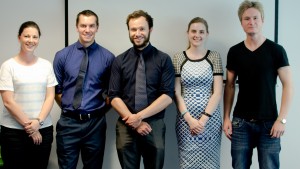
(Nicola Al-Jassar, Dan Orme, James Foreman, Sarah Hodge and Karsten Pedersen)
The students got to experience the facilities at BU by engaging in many programming activities; including how to program in Javascript from the basics to, later on, extending to a simple framework to make a Space Invaders-type game. The students were shown previous final year project work from students at BU. They also played some of the games made by students at BU. The Academy students were encouraged to build upon the code that they learnt during the day in order to support the programming that they current do at their school and also coding club.
Both staff and students thoroughly enjoyed the very inspirational day and hope to taking their programming skills to the next level!











 REF Code of Practice consultation is open!
REF Code of Practice consultation is open! BU Leads AI-Driven Work Package in EU Horizon SUSHEAS Project
BU Leads AI-Driven Work Package in EU Horizon SUSHEAS Project Evidence Synthesis Centre open at Kathmandu University
Evidence Synthesis Centre open at Kathmandu University Expand Your Impact: Collaboration and Networking Workshops for Researchers
Expand Your Impact: Collaboration and Networking Workshops for Researchers ECR Funding Open Call: Research Culture & Community Grant – Apply now
ECR Funding Open Call: Research Culture & Community Grant – Apply now ECR Funding Open Call: Research Culture & Community Grant – Application Deadline Friday 12 December
ECR Funding Open Call: Research Culture & Community Grant – Application Deadline Friday 12 December MSCA Postdoctoral Fellowships 2025 Call
MSCA Postdoctoral Fellowships 2025 Call ERC Advanced Grant 2025 Webinar
ERC Advanced Grant 2025 Webinar Update on UKRO services
Update on UKRO services European research project exploring use of ‘virtual twins’ to better manage metabolic associated fatty liver disease
European research project exploring use of ‘virtual twins’ to better manage metabolic associated fatty liver disease